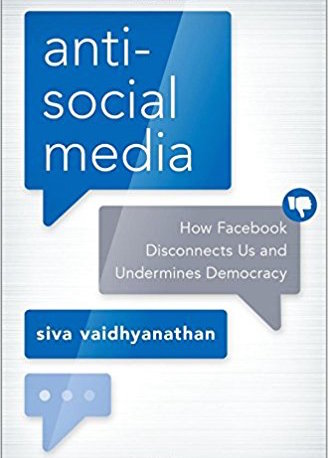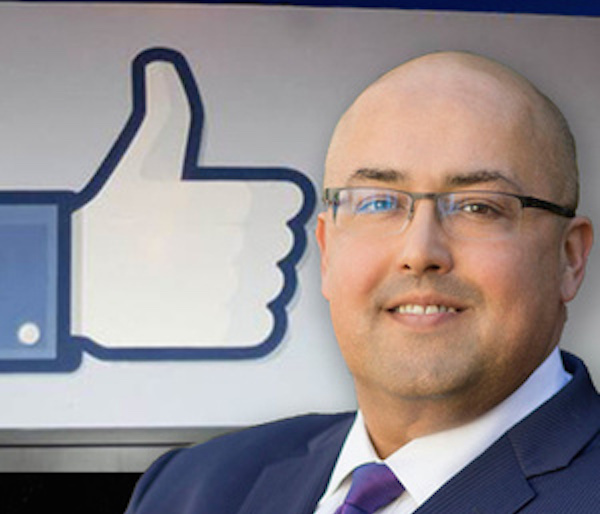Book Review: Facing Up to the Damage Wrought by Facebook
“Resistance is futile. But resistance seems necessary.”
Antisocial Media: How Facebook Disconnects Us and Undermines Democracy, by Siva Vaidhyanathan. Oxford University Press, 288 pages, $24.95.
By Dan Kennedy

The reason that Facebook is so evil is that Mark Zuckerberg is so good. According to Siva Vaidhyanathan, a professor of media studies at the University of Virginia, the former wunderkind has drunk deeply of his own Kool-Aid and genuinely believes that his creation is a benevolent force in the world. “Zuckerberg has a vibrant moral passion,” Vaidhyanathan writes in his new book, Antisocial Media. “But he lacks a historical sense of the horrible things that humans are capable of doing to each other and the planet.”
From propagating fake news to violating our privacy, from empowering authoritarian regimes to enabling anti-Semitic advertising, Facebook has become the social network everyone loves to hate. Vaidhyanathan, whose previous books include The Googlization of Everything — and Why We Should Worry (2011), has produced a valuable guide, written in clear, non-academic prose, to the monstrous force Facebook has become. And if his overview of what’s gone wrong with Facebook will seem familiar to those of us who obsess about these things, it nevertheless serves as a worthwhile introduction to the Zuckerborg and all that it has wrought. If only Vaidhyanathan had some compelling ideas on what to do about it. If only any of us did.
Facebook’s malign omnipresence came about quickly. Founded in 2004, it wasn’t until the dawn of the current decade that it became a behemoth. With 2.2 billion active monthly users, Facebook is, for many people, synonymous with the internet itself — the place where your aunt and uncle share photos of their pets, updates from their vacations, and, of course, links to memes and conspiracy theories about George Soros’s non-existent Nazi past and the “deep state” plot to overthrow President Trump.
Such craziness has serious real-world consequences. It may not be an exaggeration to say that Trump became president partly because of Facebook, as Russian propagandists, Cambridge Analytica, and the Trump campaign itself all bought ads to bolster Trump’s message and to persuade possible Hillary Clinton voters to stay home on Election Day. The Facebook effect was probably not as powerful as James Comey’s bizarre obsession with Clinton’s emails — or, for that matter, Electoral College math. But given that Trump was elected by just a handful of votes in a few swing states, it seems plausible that Clinton might otherwise have overcome those obstacles.
There’s nothing new about political advertising, even if Facebook’s tools for microtargeting tiny slices of users based on the information they themselves have provided are unusually precise and pernicious. More ominous, Vaidhyanathan argues, is that the Facebook environment encourages the sort of fragmented thinking and emotional reactions that are antithetical to healthy civic engagement and that helps give rise to an authoritarian figure like Trump. Everything looks the same in your news feed. And since Facebook’s algorithm is designed to give you more of the type of content that you interact with, you become increasingly sealed off from viewpoints you don’t agree with. Vaidhyanathan’s attempt to shoehorn Trump into his overarching theory of Facebook is a bit awkward given that Trump’s social-media drug of choice is Twitter. Nevertheless, he is surely on to something in arguing that the reductive discourse that characterizes Facebook helped fuel Trump’s rise.
“After a decade of deep and constant engagement with Facebook, Americans have been conditioned to experience the world Trump style,” Vaidhyanathan writes. “It’s almost as if Trump were designed for Facebook and Facebook were designed for him. Facebook helped make America ready for Trump.”
Vaidhyanathan is not the first to take note of the distractedness that has come to define the digital age. Nicholas Carr, in his 2010 book The Shallows: What the Internet Is Doing to Our Brains, laments that the internet has given rise to a culture of skimming rather than deep reading and warns: “As our window onto the world, and onto ourselves, a popular medium molds what we see and how we see it — and, eventually, if we use it enough, it changes who we are, as individuals and as a society.” Carr barely mentions Facebook, which at the time had not yet become a hegemonic force. But there is little doubt that it has only accelerated those trends.
So what is to be done? In a healthier political climate, Vaidhyanathan writes, we might expect our elected officials to act — by mandating greater privacy protections and by forcing Facebook to sell off some of its related businesses such as Instagram, WhatsApp, and Messenger. But he holds out little hope, even though Europe is moving in that direction. And he identifies a specific reason for his pessimism by describing two competing philosophies of corporate leadership in the United States, neither suited to dealing with the menace we face. One, market fundamentalism, holds that the sole obligation of a corporation is to make as much money as possible for its shareholders. The other, the social responsibility model, sees a role for corporations — but not for government — in addressing environmental and cultural concerns and in helping to make the world better. Vaidhyanathan places Facebook squarely within the latter tradition. Remember, he sees Zuckerberg at root as an earnest if misguided idealist.

Author Siva Vaidhyanathan. Photo: University of Texas.
The problem is that both of these philosophies are based on differing notions of corporate libertarianism. Each exalts the business leader as the exemplar to which society should aspire. By embracing a binary view of the corporation’s role, we have, Vaidhyanathan argues, essentially eliminated the public sphere from the discussion of how to solve universal problems. Rather than looking to elected leaders, we look to people like Bill Gates, Elon Musk, Laureen Powell Jobs, and, yes, Mark Zuckerberg. We embrace “innovation” rather than real progress that benefits everyone. Given the state of our politics, that might seem like logical behavior. But it’s also behavior based on the nostrum popularized by Ronald Reagan that government is the problem, not the solution. Say something often enough over the course of nearly four decades and it becomes true.
There is some hope. Although Vaidhyanathan doesn’t mention it, there are signs that journalism is becoming less dependent on Facebook. According to the web metrics firm Chartbeat, news organizations are seeing a decreasing amount of referral traffic from Facebook and an increasing amount of direct traffic to their websites and other digital platforms. “The increase in direct traffic matters because it enables publishers to control their own destiny,” writes Lucia Moses of Digiday. “They have more data on reader behavior, which enables them to better target readers with more content and offers for subscriptions and other revenue drivers.” Given the parlous state of the news business, any shift away from Facebook is a positive development.
Moreover, there are signs that we have reached peak Facebook, with young people in particular turning away from the service. According to Hanna Kozlowska, writing in Quartz, Facebook usage among 12- to 24-year-olds is declining, and overall usage in the United States and Canada is starting to shrink as well. That’s not to say Facebook is about to go the way of Friendster or MySpace. But perhaps a shrinking user base, combined with the controversy and legal woes Zuckerberg is dealing over privacy violations and other scandals, will lead to a kinder, gentler Facebook.
Ultimately, Vaidhyanathan says, it’s up to us. “Reviving a healthy social and political life would require a concerted recognition of the damage Facebook has done and a campaign to get beyond its spell,” he writes. “If millions were urged to put Facebook in its proper place, perhaps merely as a source of social and familial contact rather than political knowledge or activism, we could train ourselves out of the habit.” Later he writes: “Resistance is futile. But resistance seems necessary.”
Dan Kennedy is an associate professor of journalism at Northeastern University, a panelist on WGBH-TV’s Beat the Press, and the author of The Return of the Moguls: How Jeff Bezos and John Henry Are Remaking Newspapers for the Twenty-First Century (ForeEdge). His blog, Media Nation, is online at dankennedy.net.

“Reviving a healthy social and political life would require a concerted recognition of the damage Facebook has done and a campaign to get beyond its spell.” Terrific advice, what does ‘get beyond its spell” mean? Simply turning Facebook off? That is resistance? It will take more than that — and moderates are going to have gird their loins. As Franklin Foer writes in his book World Without Mind: The Existential Threat of Big Tech, “What we need to remember is that we are not just merging with machines, but with the companies that run the machines.” We — and that means universities and media companies — need to do more than say no to Facebook while profiting from social media and technology. The real call, in Foer’s words, is “as a society … to spring to our senses and impose wise policies of state that protect the culture, democracy, and the individual from the corrosiveness of these corporations.” That does not mean settling for the lucrative dream of a “kinder, gentler Facebook” — which is an oxymoron.